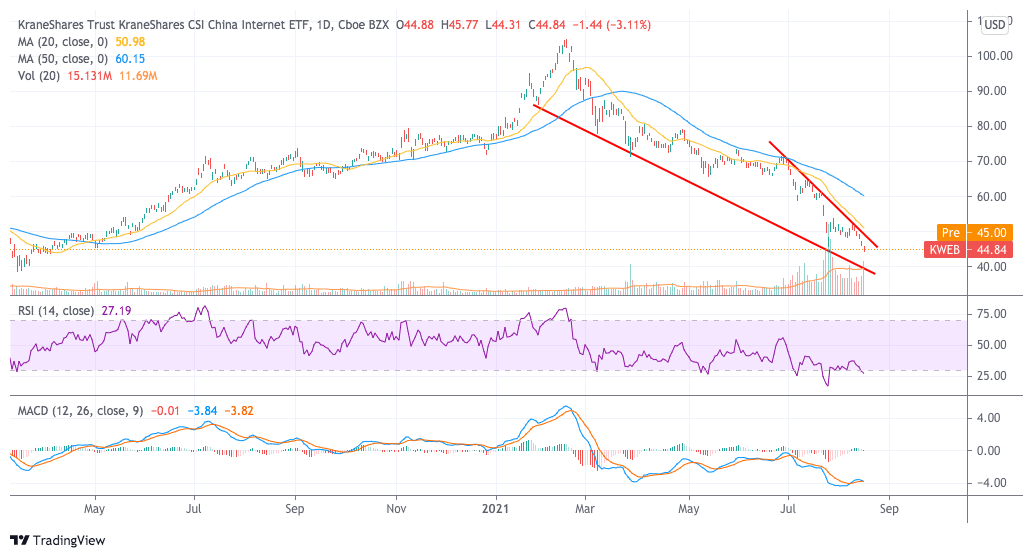
Chinese stocks have continued to suffer this week as regulators have unveiled a new set of rules applicable to tech companies within the country that seek to prevent unfair business practices.
The latest weakness in US-listed Chinese issues is reflected by the performance of the Nasdaq Golden Dragon China Index (HXC), a benchmark that tracks the country’s most important stocks, as the index has slid 6.2% since the week started amid increasing concerns about regulator’s hostile attitude against big corporations.
Meanwhile, the country’s tech sector has been among the most battered along with the private education industry, with companies like Alibaba (BABA), Tencent Holdings (TME), and JD.com (JD) taking strong hits in their valuations amid the latest actions taken by Beijing’s authorities to regulate the space.

The KraneShares Trust CSI China Internet (KWEB) exchange-traded fund (ETF) reflects the deterioration in the market capitalization of Chinese tech firms as the fund has plunged 6.6% this week while it has lost as much as 42% of its value since the year started.
KWEB’s top holdings include the above-mentioned stocks along with others like Meituan (MPNGF), Pinduoduo (PDD), and Baidu (BIDU).
The latest set of rules now imposed on tech companies in the country, as mandated by the State Administration for Market Regulation (SAMR), included the following:
- Operators must abstain from providing false data when advertising (number of clicks, number of people who have bought a certain item, etc).
- Companies must not hide negative reviews on their product pages.
- Companies must abstain from using algorithms and other advanced AI-supported tactics to influence buyers.
- Tactics like traffic hijacking are prohibited.
- Operators must abstain from implementing tactics that seek to collect and analyze data from competitors.
Moreover, the Chinese government has reportedly been contemplating the idea of curving what the government has deemed as “excessive” incomes. In this regard, President Xi Jinping stated during a meeting with top economic and financial officials that there should be a “reasonable adjustment” to deal with the country’s wealth gap while he encouraged wealthy Chinese individuals to give back to society.
This statement instilled further fears about an increasingly anti-capitalist attitude from Jingping’s administration and they could underline more upcoming changes to the country’s practices in regards to private property, the government’s intervention in the private sector, and other similar matters.
Multiple hedge funds dump Chinese stocks
A large group of investment funds led by some of the wealthiest investors in the world has been reducing their exposure to Chinese equities lately amid this increasingly hostile attitude from regulators toward the country’s largest corporations.
Notably, during the second quarter of the year, George Soros’ fund dumped a significant number of Chinese socks including Baidu (BIDU) and Tencent Music (TME) while Dan Loeb from Third Point trimmed his exposure to JD.com (JD) by selling as much as 400,000 shares of the Chinese e-commerce giant.
Meanwhile, Cathie Wood’s ARK Invest funds have also been reducing their exposure to Chinese stocks as indicated by her latest filings. According to data compiled by WhaleWisdom, the fund trimmed its position in Tencent by selling 863,560 shares during the second quarter of 2021 while it nearly closed out its position on Baidu (BIDU) upon selling more than 4.44 million shares of the Chinese search engine.
SEC Chairman Gary Gensler issues warning concerning Chinese stocks
The head of the US Securities and Exchange Commission (SEC) delivered a stark warning to investors this Monday in regards to the risks of investing in Chinese stocks upon highlighting that most investors are not fully aware of the caveats of participating in the Asian country’s stock market.
In this regard, Gensler stated that since the Chinese government does not allow foreigners to own or invest in a wide range of the country’s top corporations, shell companies have been incorporated to act as intermediaries, offering investors the possibility of buying a stake in Chinese businesses indirectly through these vehicles.
These remarks come only a few days after the SEC temporarily halted initial public offerings (IPO) from Chinese companies as the agency is demanding further disclosures about how these firms have been structuring these offerings through so-called Variable Interest Entities (VIEs).
These organizations are incorporated as a vehicle through which investors can get exposure to the Chinese-based business without them holding an equity interest in the company.
Instead, they offer this kind of exposure through legal arrangements and contracts that could easily be prohibited or dramatically modified by Chinese authorities at any given point – a situation that exposes investors to significant risks.
Moving forward, the Chairman of the SEC has asked his team to review the terms of these arrangements and demand adequate disclosures of the caveats and risks to which investors are exposed as a result of investing in companies within China through these vehicles.

Question & Answers (0)